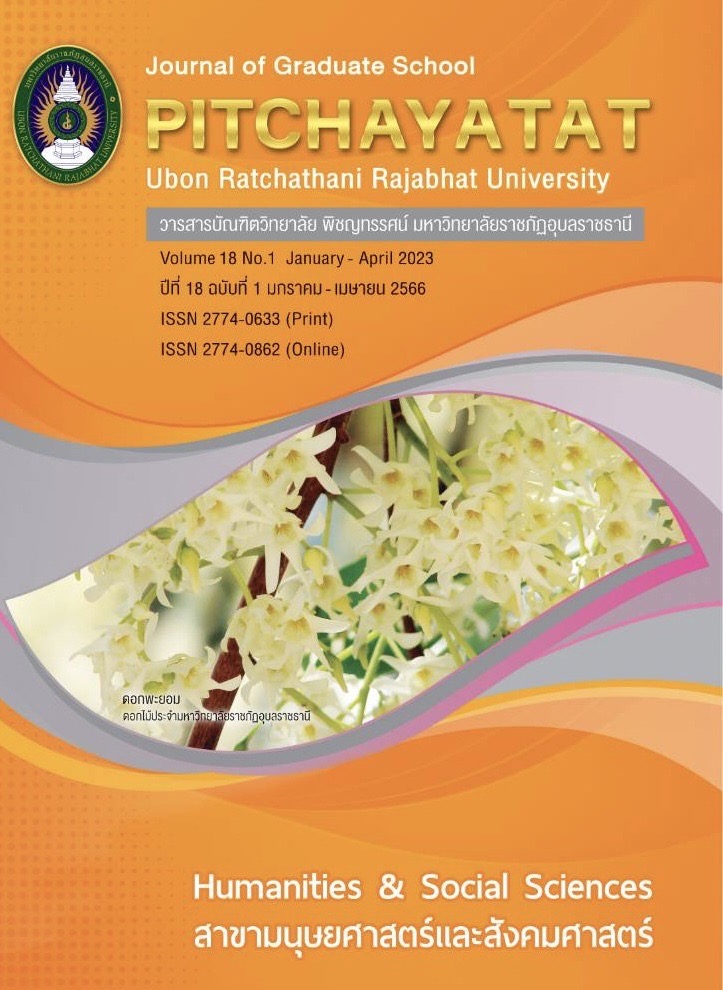การพัฒนากิจกรรมการเรียนรู้การเขียนโปรแกรมคอมพิวเตอร์แบบบล๊อคลาก-วางร่วมกับกระบวนการคิดเชิงอัลกอริทึมด้วยเทคนิคเพื่อนช่วยเพื่อนที่มีต่อการเขียนโปรแกรมคอมพิวเตอร์เชิงข้อความของนักเรียนระดับชั้นประถมศึกษาปีที่ 6
คำสำคัญ:
การเขียนโปรแกรม, โปรแกรมบล๊อคลาก-วาง, โปรแกรมเชิงข้อความ, การคิดเชิงคำนวณบทคัดย่อ
การวิจัยนี้มีวัตถุประสงค์เพื่อ 1) พัฒนาการจัดกิจกรรมการเรียนรู้การเขียนโปรแกรมคอมพิวเตอร์เชิงข้อความด้วยการเขียนโปรแกรมคอมพิวเตอร์แบบบล๊อคลาก-วางร่วมกับกระบวนการคิดเชิงอัลกอริทึมด้วยเทคนิคเพื่อนช่วยเพื่อนสำหรับนักเรียนระดับชั้นประถมศึกษาปีที่ 6 2) ศึกษาการจัดกิจกรรมการเรียนรู้ด้วยการเขียนโปรแกรมคอมพิวเตอร์แบบบล๊อคลาก-วางร่วมกับกระบวนการคิดเชิงอัลกอริทึมด้วยเทคนิคเพื่อนช่วยเพื่อนที่มีต่อผลการเรียนรู้การเขียนโปรแกรมคอมพิวเตอร์เชิงข้อความ และ 3) ศึกษาการคิดเชิงคำนวณของนักเรียนระดับชั้นประถมศึกษาปีที่ 6 ที่ผ่านการใช้การจัดกิจกรรมการเรียนรู้ด้วยการเขียนโปรแกรมคอมพิวเตอร์แบบบล๊อคลาก-วางร่วมกับกระบวนการคิดเชิงอัลกอริทึมด้วยเทคนิคเพื่อนช่วยเพื่อน และตัวอย่างในการวิจัยในครั้งนี้ คือ นักเรียนชั้นประถมศึกษาปีที่ 6 ที่กำลังศึกษาในโรงเรียนกลุ่มโรงเรียนแม่เล่ย์ สังกัดสำนักงานเขตพื้นที่การศึกษาประถมศึกษานครสวรรค์ เขต 2 จำนวน 47 คน ได้มาโดยวิธีการสุ่มอย่างง่าย โดยใช้โรงเรียนเป็นหน่วยสุ่ม เครื่องมือในการวิจัย คือ แผนการจัดการเรียนรู้ แบบประเมินความสามารถปฏิบัติการเขียนโปรแกรมคอมพิวเตอร์แบบบล๊อคลาก-วาง โปรแกรมการเขียนโปรแกรมคอมพิวเตอร์เชิงข้อความ และแบบประเมินการคิดเชิงคำนวณ สถิติที่ใช้ในการวิเคราะห์ข้อมูล ได้แก่ ค่าเฉลี่ย ส่วนเบี่ยงเบนมาตรฐาน และการทดสอบที
ผลการวิจัยครั้งนี้พบว่า
- ผลการประเมินคุณภาพแผนการจัดการเรียนรู้โดยใช้เทคนิคการเขียนโปรแกรมคอมพิวเตอร์แบบบล๊อคลาก-วางร่วมกับกระบวนการคิดเชิงอัลกอริทึมด้วยเทคนิคเพื่อนช่วยเพื่อน จากผู้เชี่ยวชาญ 3 ท่าน โดยภาพรวมคุณภาพอยู่ในระดับดี (x̅ = 4.26) สามารถนำไปจัดการเรียนรู้ได้
- ผลการใช้กิจกรรมการเรียนรู้ด้วยการเขียนโปรแกรมคอมพิวเตอร์แบบบล๊อคลาก-วางร่วมกับกระบวนการคิดเชิงอัลกอริทึมด้วยเทคนิคเพื่อนช่วยเพื่อน พบว่า ผลการเรียนรู้ก่อนการใช้กิจกรรมการเรียนรู้ มีคะแนนเฉลี่ย เท่ากับ 7.02 คะแนน และผลการเรียนรู้หลังการใช้กิจกรรม เท่ากับ 12.77 คะแนน เมื่อนำมาเปรียบเทียบ ปรากฏว่าหลังเรียนสูงกว่าก่อนเรียน อย่างมีนัยสำคัญทางสถิติที่ระดับ .05 และผลการประเมินความสามารถปฏิบัติการเขียนโปรแกรมของผู้เรียนโดยใช้กิจกรรมการเรียนรู้ด้วยการเขียนโปรแกรมคอมพิวเตอร์แบบบล๊อคลาก-วางร่วมกับกระบวนการคิดเชิงอัลกอริทึมด้วยเทคนิคเพื่อนช่วยเพื่อน พบว่า ความสามารถปฏิบัติการเขียนโปรแกรมแบบบล๊อคลาก-วางอยู่ในระดับดี (x̅ = 3.25) และความสามารถปฏิบัติการเขียนโปรแกรมเชิงข้อความอยู่ในระดับดี (x̅ = 3.05)
- ผลการประเมินการคิดเชิงคำนวณนักเรียนของนักเรียนระดับชั้นประถมศึกษาปีที่ 6 ที่ใช้กิจกรรมการเรียนรู้ด้วยการเขียนโปรแกรมคอมพิวเตอร์แบบบล๊อคลาก-วางร่วมกับกระบวนการคิดเชิงอัลกอริทึมด้วยเทคนิคเพื่อนช่วยเพื่อน พบว่า อยู่ในระดับดี (x̅ = 3.10)
เอกสารอ้างอิง
กนกรัตน์ จิรสัจจานุกูล. การใช้งานโปรแกรม Code.org เบื้องต้น. (ออนไลน์) 2561 (อ้างเมื่อ 19 กุมภาพันธ์
. จาก http://www.thaischool1.in.th/_files_school/77102332/document/77102332_0_20190803-155104.pdf
จีระพร สังขเวทัย. Coding กับการศึกษาในศตวรรษที่ 21. (ออนไลน์) 10 สิงหาคม 2564 (อ้างเมื่อ 4 กันยายน 2564). จาก https://www.scimath.org/article-technology/item/12414-coding-21
ทัศนีย์ กรองทอง. เริ่มต้นสอนเขียนโปรแกรมง่ายนิดเดียว. (ออนไลน์) 27 เมษายน 2559 อ้างเมื่อ 23 มกราคม 2564). จาก https://www.ipst.ac.th/news-training/cs-article/13954/intro-to-programming.html
ธิติวัฒน์ ทองคำ. การพัฒนากิจกรรมการจัดการเรียนรู้วิทยาการคำนวณแบบผสมผสานร่วมกับวิชวลโปรแกรมมิ่ง เพื่อส่งเสริมกระบวนการคิดเชิงคำนวณสำหรับนักเรียนชั้นประถมศึกษาปีที่ 5 ในโรงเรียนสังกัดสำนักงานเขตพื้นที่การศึกษาประถมศึกษาเพชรบุรีเขต 1. วิทยานิพนธ์ศึกษาศาสตรมหาบัณฑิต มหาวิทยาลัยศิลปากร, 2563.
Brackmann, C. P. et al. Development of Computational Thinking Skills through Unplugged Activities in Primary School. (online) 2017 (cited 23 January 2021). Available from; https://dl.acm.org/doi/10.1145/3137065.3137069
Dorling, D.W.M. “Scratch: A Way to Logo and Python” (online) 2015 (cited 23 January 2021). Available from; http://ispython.com/wp/wp-ontent/uploads/2014/11/Asigsce16_titled.pdf
Faber, H. H., M. D. M. Wierdsma and R. P. Doornbos. “Teaching Computational Thinking to Primary School Students via Unplugged Programming Lessons,” Journal of the European Teacher Education Network. 12 (2017): 13-24.
Geertsen, H. Tool for Transitioning from Scratch to Python. (online) 2016 (cited 4 September 2021). Available from; https://projekter.aau.dk/projekter/files/239461800/report.pdf Https://scratch.mit.edu Https://think.cs.vt.edu/blockpy/blockpy/
Mladenović, M. “Learning Programming From Scratch,” Tojet: Turkish Online Journal of Educational Technology,” November Special Issue INTE (July 2017): 419-427.
Matsuzawa, Y. et al. “Language migration in non-cs introductory programming through mutual language translation environment,”. in Proceedings of the 46th ACM Technical Symposium on Computer Science Education, 2015. Pp. 185–190.
ดาวน์โหลด
เผยแพร่แล้ว
รูปแบบการอ้างอิง
ฉบับ
ประเภทบทความ
สัญญาอนุญาต
ลิขสิทธิ์ (c) 2023 วารสารบัณฑิตวิทยาลัย พิชญทรรศน์ มหาวิทยาลัยราชภัฏอุบลราชธานี

อนุญาตภายใต้เงื่อนไข Creative Commons Attribution-NonCommercial-NoDerivatives 4.0 International License.
บทความทุกเรื่องได้รับการตรวจความถูกต้องทางวิชาการโดยผู้ทรงคุณวุฒิภายนอกอย่างน้อย 3 คน ความคิดเห็นในวารสารพิชญทรรศน์เป็นความคิดเห็นของผู้นิพนธ์มิใช่ความคิดเห็นของผู้จัดทำ จึงมิใช่ความรับผิดชอบของวารสารพิชญทรรศน์ และบทความในวารสารพิชญทรรศน์สงวนสิทธิ์ตามกฎหมายไทย การจะนำไปเผยแพร่ต้องได้รับอนุญาตเป็นลายลักษณ์อักษรจากกองบรรณาธิการ





